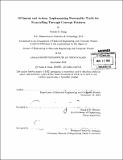| dc.contributor.advisor | Patrick H. Winston. | en_US |
| dc.contributor.author | Song, Susan S. (Susan Shuchen) | en_US |
| dc.contributor.other | Massachusetts Institute of Technology. Department of Electrical Engineering and Computer Science. | en_US |
| dc.date.accessioned | 2014-03-19T15:46:46Z | |
| dc.date.available | 2014-03-19T15:46:46Z | |
| dc.date.copyright | 2012 | en_US |
| dc.date.issued | 2012 | en_US |
| dc.identifier.uri | http://hdl.handle.net/1721.1/85808 | |
| dc.description | Thesis: M. Eng., Massachusetts Institute of Technology, Department of Electrical Engineering and Computer Science, 2012. | en_US |
| dc.description | Cataloged from PDF version of thesis. | en_US |
| dc.description | Includes bibliographical references (page 97). | en_US |
| dc.description.abstract | Personality traits such as "kind," "aggressive," and "brave" are integral to storytelling because they impart succinct descriptors of character personalities. Authors apply traits to characters, readers infer characters' traits from the narrative, and readers learn the meaning of new traits. For instance, a reader can learn the personality trait "vindictive" from Alexandre Dumas's novel The Count of Monte Cristo and then use this trait to predict or explain a character's behavior. The reader can also infer that a character from this novel, such as Edmond Dantes, is "vindictive" without needing Dumas to explicitly describe the character with this trait. With the goal of enabling computational storytelling systems to perform the abilities stated above, I present in this thesis a concept pattern-based approach to representing intentional personality traits. I articulate the processes of trait learning, application, and inference and provide steps and insights to how these processes can be computationally implemented. I also give examples of ten personality traits represented using concept patterns inside the Genesis system and show how these traits are discovered inside well-known historical narratives and works of fiction. | en_US |
| dc.description.statementofresponsibility | by Susan S. Song. | en_US |
| dc.format.extent | 97 pages | en_US |
| dc.language.iso | eng | en_US |
| dc.publisher | Massachusetts Institute of Technology | en_US |
| dc.rights | M.I.T. theses are protected by copyright. They may be viewed from this source for any purpose, but reproduction or distribution in any format is prohibited without written permission. See provided URL for inquiries about permission. | en_US |
| dc.rights.uri | http://dspace.mit.edu/handle/1721.1/7582 | en_US |
| dc.subject | Electrical Engineering and Computer Science. | en_US |
| dc.title | Of intent and action : implementing personality traits for storytelling through concept patterns | en_US |
| dc.title.alternative | Implementing personality traits for storytelling through concept patterns | en_US |
| dc.type | Thesis | en_US |
| dc.description.degree | M. Eng. | en_US |
| dc.contributor.department | Massachusetts Institute of Technology. Department of Electrical Engineering and Computer Science | |
| dc.identifier.oclc | 872117234 | en_US |
